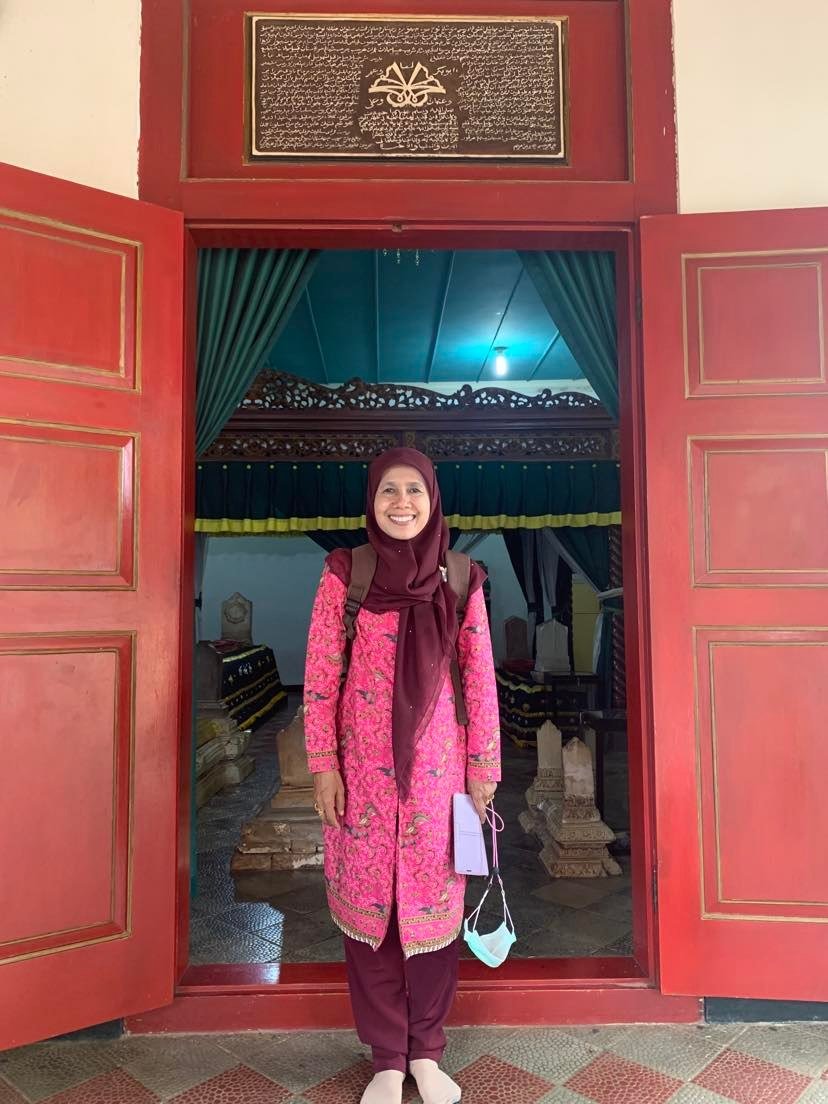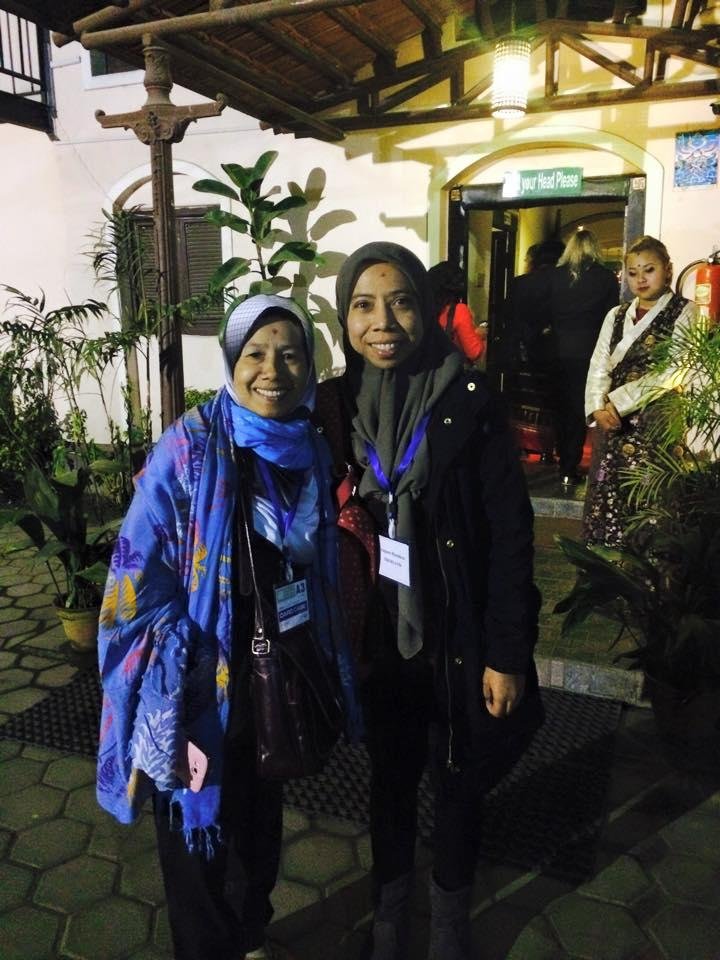
Rosidah Pusu: A Glimpse into A Malay Muslim Woman’s Activism for Justice in Thailand A personal account
I learned about Rosidah’s passing from Mariam Soh, one of the strong members of her team. Rosidah was deeply loved by people in Thailand’s southern border provinces and beyond. I found several Facebook posts expressing condolences to Rosidah’s family within those few days. In Thailand, Facebook is a primary social media platform that activists from various fields often use as a public communication channel.
Rosidah Pusu, president of N-Wave, advocated for women’s roles in addressing violence and promoting peace in Thailand’s Deep South. She was a central figure in the fight for gender justice and was deeply respected by the local community. Many young women in the region admired her as a role model and as a source of inspiration in their struggle against systemic injustices and violations of women’s rights. She passed away on Wednesday, January 29, 2025.
Nearly a week before her passing, I contacted Rosidah’s daughters to ask about her condition,havingollowing updates on her prolonged hospitalization. Five months prior to her death, I visited Rosidah at her home in Pujud, Pattani, in Thailand with friends and colleagues. She was still actively discussing work with her team, so much so that we had to remind her to take it easy. But in the end, it was clear that her dedication to helping others and driving social change was at the core of her being. I first encountered Rosidah during my undergraduate years at Prince of Songkla University, Pattani Campus (1993-1996). At the time, she worked in an academic unit for local development and was an active journalist, skilled in news writing and field reporting. Her vibrant and energetic personality clearly stood out. Our paths crossed again in 2004 when I was conducting research and teaching at the university. By then, she had left the university but remained dedicated to journalism and had expanded her work in women’s rights advocacy. That same year, conflict in Thailand’s Deep South, a region predominantly inhabited by Malay Muslims, intensified.

Amporn Marddent with Rosidah (Left)- Pic Credit- Amporn Marddent
Balancing her advocacy with motherhood, like most of her counterparts had to, Rosidah was deeply committed to her community. Whether attending meetings, organizing events, or responding to urgent matters, her children were often by her side, sometimes in school uniforms, assisting with event preparations. She was trusted by the community for her bravery, resilience, and compassion.
Born into a family where her father was a religious leader, an imam, Rosidah possessed a deep understanding of Islam despite not having formal religious training. Her ability to engage effectively with women in her community made her a powerful voice in the movement for women’s rights. Her work highlighted how faith, often viewed as a point of division, could also be a force for unity.
Rosidah’s journey into journalism began in the 1980s when she worked in a local newspaper, setting metal type for letterpress printing. This hands-on experience honed her writing skills and deepened her understanding of local issues. She later pursued a degree in communication studies while continuing her work as a journalist.
During the 1990s, Rosidah focused on justice-related issues, particularly resource management and access to livelihoods. The decentralization movement, spurred by the 1997 Constitution, prompted her to educate the public about legal changes. She created newsletters and pamphlets to simplify complex information and distributed them to mosques and communities.
Living a nomadic lifestyle at the time, Rosidah worked alongside men with equal dedication, challenging traditional beliefs about Muslim women’s roles. After marriage and starting a family, she had to navigate the demands of both work and home life. She frequently discussed Muslim women’s legal rights, including the right to wear the hijab, referencing the significant hijab demonstrations in Yala Province (1987-1988) as a key historical context (Satha-Anand 1994). She highlighted restrictions imposed on Malay Muslim students who wished to wear the veil and shared her own experiences of being forbidden to wear it in certain institutions, recounting how they had to wait until they returned home to practice their traditions. This inspired her to campaign for religious freedom.
In the early 2000s, Rosidah collaborated with the Friends of Women Foundation, which aimed to challenge cultural norms and dismantle unjust power structures. She extended her work into religious spaces, designing programs for the provincial Islamic office and initiating discussions on gender roles within Islam. Initially, these discussions were met with resistance, as religious communities were hesitant to engage with gender-related issues. However, as conflict in the region escalated, Rosidah intensified her involvement in both journalism and advocacy for women’s rights.
By 2004, Rosidah and her network of women’s groups had been working on gender rights for years when violence in her hometown worsened. As conflict spread across the southernmost provinces, families were torn apart, leaving women widowed and children orphaned. I began collaborating with Rosidah and her team, who primarily worked with widows. In many households, women were confined to domestic roles and required their husband’s permission to engage in activities outside the home. As a result, when a woman suddenly lost her husband, she often found herself unprepared to navigate life independently. Many had never worked outside their homes, handled hospital visits, or interacted with government agencies. Rosidah dedicated herself to raising awareness of the violence’s impact, collecting data on bereaved families and orphans, and mobilizing support for those affected.
Over time, Rosidah began hearing more accounts of gender-based violence, particularly domestic abuse. Women, bound by the ideal culture of obedient wives, often endured suffering in silence (Marddent et al 2019). When we worked together on a project to stop Violence against Women (VAW), we noticed a rise in reported cases alongside the intensifying regional conflict. Rosidah acknowledged the challenge of addressing domestic violence amid the larger crisis, stating, “At the time, we had little data to rely on. We knew the immediate crisis was the ongoing conflict—more children were becoming orphans; more women were becoming widows. But when we asked about the situation in our three provinces, we had no answers. That lack of knowledge was deeply troubling.”[1]
When international organizations began supporting initiatives in the region, Rosidah expanded her collaborations with policy-level government networks at the local, national, and international levels. She presented the issue of women’s participation in peacebuilding at policy forums under the UNSCR 1325 agenda and CEDAW. However, this support also came with challenges, such as defining the specific changes needed in Thailand’s conflict-affected Deep South.
While international partnerships provided funding and encouraged greater government involvement, Rosidah, and other women’s groups faced difficulties in aligning their work with donor-driven agendas and rigid project timelines. As a result, unfinished initiatives were often left without continuation, making it harder to cultivate a new generation of activists. Additionally, as funding sources became more limited and organizations shifted focus to more severe conflict zones, women’s groups had to compete for financial support, further complicating their efforts to sustain long-term advocacy.
Rosidah’s dedication is reflected not only in the numerous awards she received, such as her recognition as a women’s rights defender in 2022,[2] but also in the broader societal changes it highlights. Her work sheds light on global social transformations, the historical-political landscape of Thailand concerning minority groups, and the ongoing struggle for justice. It underscores the necessity for women to stand up and advocate for human rights and justice.
Footnotes:
- Kongsuwan, Suphawan. 2020. Muslim Women’s Rights from the Words of ‘Rosidah Pusu’, a Fighter for the End of Violence Against Women in the Southern Border Provinces of Thailand. Available in Thai at, https://www.the101.world/rosida-interview/?fbclid=IwY2xjawI08qJleHRuA2FlbQIxMQABHQ3cCSl74dRfiVre-jimoYJgVJvnOg7D2bmu7AWFPojoMa_R0iBJOTZOng_aem_m6K60jThhG1eyqoxMlgD0A
- Outstanding Human Rights Defender Award (General/Public Network Category) – Vulnerable Groups, National Human Rights Commission of Thailand, 2022. Online Available at https://www.nhrc.or.th/th/vulnerable-groups/13727
References
Marddent, Amporn et al. (2019). Break the Silence: Analysing Social Norms and Beliefs that Justify Domestic Violence against Muslim Women in the Conflict-Affected Southern Border Provinces of Thailand. Bangkok: Oxfam International.
Satha-Anand, Chaiwat. (1994). “Hijab and moments of legitimation: Islamic resurgence in Thai society,” in C.F. Keyes, L. Kendall and H. Hardacre (Eds.). Asian Visions of Authority: Religion and the Modern States of East and Southeast Asia. Honolulu: University of Hawaii Press.
(The views expressed in this article are the author’s own. Content can be used with due credit to the author and to ‘Zariya: Women’s Alliance for Dignity and Equality’)
ABOUT THE AUTHOR:

Amporn Marddent is an Assistant Professor at the Faculty of Sociology and Anthropology, Thammasat University, Thailand, specializing in gender, social justice, and ethnography. She collaborates with CBOs, NGOs, and CSOs to promote Women, Peace, and Security (WPS) and is a member of the ASEAN Women’s Peace Registry. She leads research at the ARC Centre of Excellence for the Elimination of Violence Against Women (CEVAW), focusing on Thailand’s peace process.
With a PhD in cultural anthropology from Goethe-Universität Frankfurt, Amporn has extensively published on Islamic feminism, gender-based violence, and migration. She founded the Center of Excellence on Women and Social Security at Walailak University, Southern Thailand, and has contributed to policy research for ASEAN and UN agencies. Her work integrates activism and academia to address inter-communal tensions and advocate for equality.
She can be reached at : marddent@tu.ac.th



